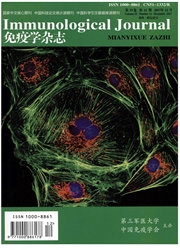

 中文摘要:
中文摘要:
目的分析类风湿性关节炎外周血单核细胞上B7-H3分子的表达及其与疾病活动程度、炎症因子水平间的相关性。方法收集69例类风湿性关节炎患者及38例健康对照组外周血,Ficoll分离单个核细胞后流式细胞仪检测CD14、B7-H3分子的表达,ELISA检测炎症因子TNF-α、IL-6的表达。统计学分析其相关性及与疾病活动程度之间的关联。结果类风关患者外周血单核细胞上B7-H3表达较健康对照组高(P〈0.001),且与疾病的分期、病程的长短、肿胀关节数、压痛关节数、疾病活动度评分28(DSA28)、类风湿因子有显著相关性,并与炎症因子TNF-α、IL-6呈正相关(P〈0.001)。结论免疫分子B7-H3可能参与类风湿性关节炎疾病的进程并可能成为疾病预防及治疗的潜在分子。
 英文摘要:
英文摘要:
To analyze B7-H3 expression on monocytes in rheumatoid arthritis(RA) and it's correlation withclinical disease parameters or the level of inflammatory cytokine, peripheral blood of 69 cases of RA patients and 38 cases of healthy controls were collected. Peripheral blood mononuclear cells(PBMC) were isolated and the CD14 and B7-H3 expressions were analyzed by flow cytometry; ELISA was carried out for IL-6 and TNF-α expression,and the correlation between B7-H3 expression and disease parameters or inflammatory cytokine was evaluated. Datashowed that B7-H3 was significantly up-regulated on monocytes in RA patients than that in healthy controls, andhas correlation with the disease stage, the length of the disease course, the DAS28 score, the tender joint count, theswollen joint count and the TNF-α, IL-6 secretion. These findings will help to clarify the function of B7-H3,including its potential role as a biomarker for RA.
 同期刊论文项目
同期刊论文项目
 同项目期刊论文
同项目期刊论文
 期刊信息
期刊信息
